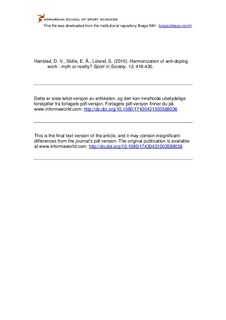| dc.contributor.author | Hanstad, Dag Vidar | |
| dc.contributor.author | Skille, Eivind Å. | |
| dc.contributor.author | Loland, Sigmund | |
| dc.date.accessioned | 2011-03-08T11:43:42Z | |
| dc.date.available | 2011-03-08T11:43:42Z | |
| dc.date.issued | 2010-03-11 | |
| dc.identifier | Seksjon for kultur og samfunn / Department of Cultural and Social Studies | |
| dc.identifier.citation | Sport in Society. 2010, 13(3), 418-430 | en_US |
| dc.identifier.issn | 1743-0437 | |
| dc.identifier.uri | http://hdl.handle.net/11250/170681 | |
| dc.description | I Brage finner du siste tekst-versjon av artikkelen, og den kan inneholde ubetydelige forskjeller fra forlagets pdf-versjon. Forlagets pdf-versjon finner du på www.informaworld.com: http://dx.doi.org/10.1080/17430431003588036 / In Brage you'll find the final text version of the article, and it may contain insignificant differences from the journal's pdf version. The original publication is available at www.informaworld.com: http://dx.doi.org/10.1080/17430431003588036 | en_US |
| dc.description.abstract | In order to examine the implementation of the World Anti Doping Agency's (WADA) policy of global harmonization of anti-doping work, a survey was conducted among the members of the Association of National Anti-Doping Organizations (ANADO). It was revealed that in many countries, the Code was not implemented in accordance with the prescribed policy, with regard to (i) the requirement on national anti-doping organizations (NADOs) having a registered testing pool, (ii) the requirements of availability for testing of the athletes, and (iii) the requirements on sanctions. Only 23 of the 32 NADOs in the sample had a registered testing pool, only 11 NADOs required availability for testing every day, and one in five NADOs did not have any procedures for dealing with athletes who had not provided information about their whereabouts. Further, two in five did not count an incomplete test as a missed test, although this is WADA's definition. WADA's goal is harmonized anti-doping work. The implementation of anti-doping policy is challenging and is to a certain extent underpinned by processes of globalization. Even among NADOs that are considered to be among the global frontrunners in the struggle against doping significant variations exist. There is reason to believe that the global picture is even more diverse. One of WADA's key challenges is to define clearly and in operational terms which rules and sanctions are to be uniform and globally implemented, and which regulations can be open to interpretation depending on economic and socio-cultural contexts. | en_US |
| dc.language.iso | eng | en_US |
| dc.publisher | Routledge | en_US |
| dc.title | Harmonization of anti-doping work: myth or reality? | en_US |
| dc.type | Journal article | en_US |
| dc.type | Peer reviewed | en_US |
| dc.subject.nsi | VDP::Social science: 200::Social science in sports: 330 | en_US |
| dc.source.pagenumber | 418-430 | en_US |
